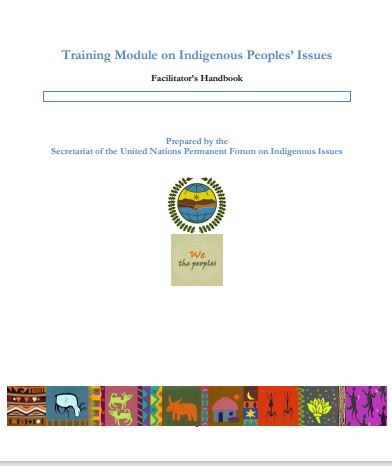Knowledge Hub
Training Manual on Forests and Trees for Food Security and Nutrition
2020
Author(s): Food and Agriculture Organization of The United Nations
The overall objective is to create awareness and enable increased investment in the forestry sector for food security and nutrition in Tanzania. This training manual is also meant to serve as a useful tool for sharing and exchanging knowledge and experiences across different regions (within the country) and beyond.

Uplifting Indigenous Coffee Farmers in Panama: A Blend of Tradition and Innovation
2023
Author(s): Food and Agriculture Organization of the United Nations
The project was implemented with the technical assistance of the Food and Agriculture Organization of the United Nations (FAO), with support of other partners.
Sustainable Development Goal 16 & Indigenous Peoples’ Collective Rights to Land, Territories & Resources
2021
Author(s): Food and Agriculture Organization of The United Nations
In this paper, FAO shares experiences and proposes actions to advance towards the realisation of Indigenous Peoples’ rights to land, territories and resources, urging the countries to protect Indigenous Peoples’ rights as an avenue to achieve the SDG 16.

FAO, Indigenous Peoples and the Free, Prior and Informed Consent
2017
Author(s): Food and Agriculture Organization of the United Nations - FAO
Free, Prior and Informed Consent (FPIC) is a specific right that pertains to indigenous peoples and is recognized in the United Nations Declaration on the Rights of Indigenous Peoples (UNDRIP). FPI...

Indigenous peoples are key to protecting wildlife and rural livelihoods
2017
Author(s): Food and Agriculture Organization of the United Nations - FAO
Sheila Wertz, FAO Senior Forestry Officer, explains the significant role of indigenous peoples plays in biodiversity conservation.
A Training Manual for Indigenous Peoples and Local Communities on the Convention on Biological Diversity - Module 1
2020
Author(s): The Secretariat of the Convention on Biological Diversity
Indigenous peoples and local communities (IPLCs) live in areas that overlap with zones high in biodiversity. These high biodiversity areas often are also rich in cultural diversity, as evidenced by the diversification of languages spoken in these areas. Considering this overlap, decisions concerning biodiversity may impact their lives. Strong knowledge about the international and national regulation and policy on biodiversity is important to enhance the full and effective participation of IPLCs in implementing the Convention on Biological Diversity (CBD) at all levels.
The Right to Adequate Food and Indigenous People
2009
Author(s): Knuth L (FAO Right to Food Team)
The paper also focuses on the analysis of the right to food from an indigenous peoples’ perspective and addresses the main issues of concern to indigenous peoples that crosscut the right to food - including access to natural resources, intellectual property rights and the environment.
Implementing the UN Declaration on the Rights of Indigenous Peoples: Handbook for Parliamentarian
2015
Author(s): The United Nations
The rights of indigenous peoples enshrined in the UN Declaration reflect existing rights affirmed in international human rights law, now placed in the context of indigenous peoples’ realities. Parliamentarians have an important role to play in ensuring the implementation of international human rights, including the UN Declaration and related legal and constitutional norms.

Training Module on Indigeneous Peoples’ Issues
2010
Author(s): The Secretariat of the United Nations Permanent Forum on Indigenous Issues
This section of the training module tries to capture some short key messages from agreed UN policy documents, which are intended to guide UN staff members during the planning and implementation of development processes. Adherence to this guidance should ultimately result in the improved recognition of indigenous peoples’ rights at the national level, putting policy into practice.
Guidelines on Indigeneous Peoples’ Issues
2000
Author(s): Team of the Inter-Agency Support Group on Indigenous Issues (IASG)
The purpose of the Guidelines is to assist the United Nations system to mainstream and integrate indigenous peoples’ issues in processes for operational activities and programme at the country level. The Guidelines set out the broad normative, policy and operational framework for implementing a human rights-based and culturally sensitive approach to development for and with indigenous peoples



